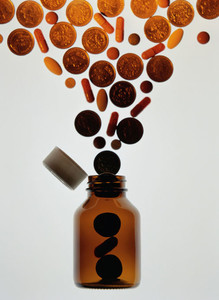Biosuperiors or biobetters are improvements to originator biological molecules, whereas biosimilars are structural imitations of the originator. But how will the pharma industry choose to pursue this lucrative market and benefit from patent expirations on biologicals? Will biobetters or biosimilars be the winners?
Biobetters
Biobetters contain similar active ingredients, e.g. an antibody that targets the same protein as a product already on the market, but possess some molecular or chemical modification that constitutes an improvement over the originator drug, e.g. enhanced bioavailability or reduced immunogenicity [1].
A major advantage to manufacturers of biobetters is the fact that they have lower early-stage R & D costs compared to originator drugs.
Biobetters also have an advantage over biosimilars as they constitute an improvement over the originator and any biosimilar competitors, and should be patentable. However, it can also be the case that, because the active ingredient is so similar to an already marketed product, it may not be possible to patent some biobetters. Patents are granted only to products that are shown to be a significant advance over technology already known to the public. Many biobetters may not meet that standard [2].
Despite the fact that patent protection may not be available, provided that the market is sufficiently large to warrant full-blown clinical trials, regulatory pathways in the EU and US could still encourage the development of biobetters rather than biosimilars. These biobetters would use the standard biological approval route, rather than the abbreviated pathway used by biosimilars. This would mean that biobetters, as ‘new drugs’ would benefit from market exclusivity, even if they are not different enough to gain patent protection.
Biosimilars
Biosimilars are structural imitations of the originator, promising the same effect as originator biologicals, but at a reduced price. Given the fact that annual treatment costs for patented biologicals can run into the tens of thousands of dollars [3], biosimilars represent an important alternative for both patients and payers.
China and India are seen as being areas of major opportunity for biosimilar manufacturers, both in terms of exclusivity and in terms of costs. Both countries have relatively short (China) or no (India) market and data exclusivity provisions to protect originator drugs. Cost savings of 30–50% are reported for manufacturing biosimilars in China compared to in Europe or the US [4], while in India cost reductions of around 40% have been suggested [5]. The Indian government has also been actively encouraging biosimilar development by investment in government-led initiatives and by constructing biotechnology parks [6].
There can be no doubt that biosimilars are part of the future of the pharmaceutical industry. The global biosimilars market is expected to grow from US$243 million in 2010 to US$3.7 billion in 2015 according to 2011 data from Datamonitor [7]. Major generics players such as Teva, Sandoz and Hospira have already signalled that biosimilars are a priority for growth, as has newcomer to the biosimilars market Merck.
Partnerships, it seems, are set to drive biosimilars development. Unlikely partnerships that have taken place include those between South Korean electronics giant Samsung and petrochemicals group Hanwha Chemical, as well as that between Indian industrial giant Reliance and Japanese digital camera maker Fujifilm.
Samsung set up a biosimilars joint venture back in February 2011 with contract research organisation Quintiles to provide biologicals manufacturing and biosimilar development. Samsung has set the lofty goal of generating US$1.8 trillion a year from biopharmaceuticals by 2020 [8].
Meanwhile Merck Bioventures made a deal in June 2011 with Hanwha, estimated to be worth up to US$720 million [9], to develop and commercialise a biosimilar version of Amgen and Pfizer’s blockbuster rheumatoid arthritis drug Enbrel (etanercept) [10].
Regulatory issues
Regulatory issues may be the driving factor determining whether manufacturers go down the biobetter or biosimilar route. To receive a table giving more information regarding regulatory issues in China, Europe, India and the US, please contact GaBI Online.
Related article
Biotech growth and biosimilar opportunities in India
References
1. GaBI Online - Generics and Biosimilars Initiative. Biobetters rather than biosimilars [www.gabionline.net]. Mol, Belgium: Pro Pharma Communications International; [cited 2011 October 14]. Available from: www.gabionline.net/Biosimilars/General/Biobetters-rather-than-biosimilars
2. Konski AF. Generic Biologics. BioProcess International September 2011;9(8):34-41.
3. GaBI Online - Generics and Biosimilars Initiative. Hurdles to entering the biosimilars’ market [www.gabionline.net]. Mol, Belgium: Pro Pharma Communications International; [cited 2011 October 14]. Available from: www.gabionline.net/Biosimilars/General/Hurdles-to-entering-the-biosimilars-market
4. GaBI Online - Generics and Biosimilars Initiative. Is China set to lose its low cost appeal? [www.gabionline.net]. Mol, Belgium: Pro Pharma Communications International; [cited 2011 October 14]. Available from: www.gabionline.net/Reports/Is-China-set-to-lose-its-low-cost-appeal
5. Frost and Sullivan. Strategic analysis of Indian biosimilar market. 10 May 2011.
6. GaBI Online - Generics and Biosimilars Initiative. Indian government encourages biosimilars [www.gabionline.net]. Mol, Belgium: Pro Pharma Communications International; [cited 2011 October 14]. Available from: www.gabionline.net/Policies-Legislation/Indian-government-encourages-biosimilars
7. GaBI Online - Generics and Biosimilars Initiative. Stada and Richter to collaborate on biosimilar development [www.gabionline.net]. Mol, Belgium: Pro Pharma Communications International; [cited 2011 October 14]. Available from: www.gabionline.net/Biosimilars/News/Stada-and-Richter-to-collaborate-on-biosimilar-development
8. GaBI Online - Generics and Biosimilars Initiative. Samsung to enter biosimilars market [www.gabionline.net]. Mol, Belgium: Pro Pharma Communications International; [cited 2011 October 14]. Available from: www.gabionline.net/Biosimilars/News/Samsung-to-enter-biosimilars-market
9. Merck Buys Hanwha Drug-Marketing Rights. WSJ. 14 June 2011.
10. GaBI Online - Generics and Biosimilars Initiative. Merck enters biosimilars deal with Korea’s Hanwha [www.gabionline.net]. Mol, Belgium: Pro Pharma Communications International; [cited 2011 October 14]. Available from: www.gabionline.net/Biosimilars/News/Merck-enters-biosimilars-deal-with-Korea-s-Hanwha
Source: Outsourcing-Pharma, Reuters, WSJ








 0
0











Post your comment